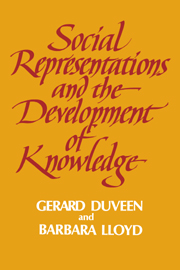Book contents
- Frontmatter
- Contents
- List of figures
- List of tables
- List of contributors
- Acknowledgements
- 1 Introduction
- 2 The underlife of the nursery school: young children's social representations of adult rules
- 3 A semiotic analysis of the development of social representations of gender
- 4 Children's representations of social relations
- 5 Social representations of childhood: an implicit theory of development
- 6 What is in an image? The structure of mothers' images of the child and their influence on conversational styles
- 7 The acquisition of reflexive social emotions: the transmission and reproduction of social control through joint action
- 8 From social cognition to social representations in the study of intelligence
- 9 Prototypes of the psychologist and professionalisation: diverging social representations of a developmental process
- 10 Social psychology and developmental psychology: extending the conversation
- Author index
- Subject index
8 - From social cognition to social representations in the study of intelligence
Published online by Cambridge University Press: 08 March 2010
- Frontmatter
- Contents
- List of figures
- List of tables
- List of contributors
- Acknowledgements
- 1 Introduction
- 2 The underlife of the nursery school: young children's social representations of adult rules
- 3 A semiotic analysis of the development of social representations of gender
- 4 Children's representations of social relations
- 5 Social representations of childhood: an implicit theory of development
- 6 What is in an image? The structure of mothers' images of the child and their influence on conversational styles
- 7 The acquisition of reflexive social emotions: the transmission and reproduction of social control through joint action
- 8 From social cognition to social representations in the study of intelligence
- 9 Prototypes of the psychologist and professionalisation: diverging social representations of a developmental process
- 10 Social psychology and developmental psychology: extending the conversation
- Author index
- Subject index
Summary
Introduction
The last decade has seen a growing interest in such topics as indigenous psychologies (Heelas and Lock, 1981), implicit theories (Leyens, 1983) and everyday ideas (Goodnow, 1981). The assumption underlying this research has been that lay perspectives are crucial to an understanding of prevailing patterns of action and of organising knowledge in individuals. As yet, however, there has been little attempt to ask broader theoretical questions such as how we are to account for the genesis of lay conceptions, or what their relation might be to scientific theories. The latter question is particularly interesting, as many argue that theories in the social sciences represent elaborations of everyday language, and that it is a mistake for social scientists to believe that they can have a perspective on social life which transcends the boundaries of a common-sense understanding of a culture.
In fact, Semin (1987) argues that there is an overlap between ordinary language models of psychological realities and various social scientific models; an overlap which indicates that the scientific structures are idealised abstractions and are both the preconditions and consequences of references to topics such as intelligence, drug addiction or development in everyday discourse. One implication of these considerations is that empirical analyses in social psychology presuppose a common-sense understanding of the social world which investigators share with their subjects. To rephrase Semin (1987, p. 340), the scientific investigation of topics such as learning or development takes as its starting point the conceptual edifice of a common-sense understanding of intelligence and particularly the origins of interindividual differences, i.e. a detailed knowledge of the way people of a specific culture think of this phenomenon.
- Type
- Chapter
- Information
- Social Representations and the Development of Knowledge , pp. 126 - 143Publisher: Cambridge University PressPrint publication year: 1990
- 15
- Cited by



